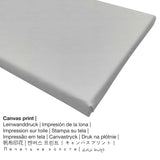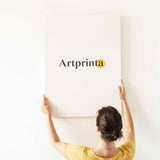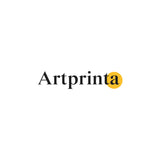Victor Dubreuil, 1900 - One Dollar Silver Certificate - fine art print
Tax included. Shipping calculated at checkout.
Background information on the art replica "One Dollar Silver Certificate"
The 20th century painting One Dollar Silver Certificate was created by the male American painter Victor Dubreuil. The more than 120 years old original was painted with the size: 22,9 × 30,5 cm (9 × 12 in). Oil on canvas was used by the North American artist as the technique for the artwork. The artpiece has the following text as inscrption: signed in red, lower right: "V. Dubreuil". It is included in the Art Institute Chicago's collection. The modern art public domain artpiece is being included with courtesy of Art Institute Chicago. Moreover, the artpiece has the creditline: Through prior acquisition of the Charles H. and Mary F. S. Worcester Collection. Moreover, alignment is in landscape format with a ratio of 4 : 3, which means that the length is 33% longer than the width.
Which item material do you like most?
In the dropdown lists right next to the product you can select your prefered size and material. You can choose among the following product customization options:
- Canvas print: The canvas print is a printed canvas mounted on a wooden stretcher. A canvas generates the plastic effect of three dimensionality. The great advantage of canvas prints is that they are relatively low in weight, meaning that it is easy to hang your Canvas print without the use of additional wall-mounts. Hence, canvas prints are suitable for any kind of wall.
- Poster print (canvas material): The poster print is a UV printed cotton canvas paper with a nice structure on the surface. It is excellently suited for putting the fine art print using a personal frame. Please note, that depending on the absolute size of the canvas poster print we add a white margin of approximately 2-6cm round about the painting to facilitate the framing with your custom frame.
- Acrylic glass print: An print on acrylic glass, which is often described as a plexiglass print, will change your favorite original work of art into beautiful décor and offers a good alternative to canvas and dibond prints. Your work of art is custom-made with the help of state-of-the-art UV print technology. This has the image effect of vivid and impressive colors. The great advantage of a plexiglass print is that contrasts plus minor color details become more exposed with the help of the granular tonal gradation. The plexiglass with real glass coating protects your selected art print against light and heat for up to 60 years.
- Aluminium dibond print (metal): An Aluminium Dibond print is a material with a true depth effect, which makes a fashionable look throuch a non-reflective surface structure. The white and bright parts of the original work of art shine with a silky gloss, however without any glow.
Important legal note: We try everything to depict the art products as precisely as possible and to demonstrate them visually on the respective product detail pages. Nonetheless, the tone of the print products and the print result may differ slightly from the image on your device's monitor. Depending on the settings of your screen and the quality of the surface, color pigments can unfortunately not be printed as exactly as the digital version on this website. Given that the art prints are processed and printed manually, there may also be minor discrepancies in the size and exact position of the motif.
The product
| Article type: | fine art print |
| Reproduction method: | digital reproduction |
| Production method: | digital printing |
| Origin of the product: | produced in Germany |
| Stock type: | on demand |
| Intended product usage: | art print gallery, wall art |
| Image orientation: | landscape alignment |
| Side ratio: | length : width - 4 : 3 |
| Meaning of side aspect ratio: | the length is 33% longer than the width |
| Materials available: | metal print (aluminium dibond), poster print (canvas paper), acrylic glass print (with real glass coating), canvas print |
| Canvas on stretcher frame (canvas print) size variants: | 40x30cm - 16x12", 80x60cm - 31x24", 120x90cm - 47x35", 160x120cm - 63x47" |
| Acrylic glass print (with real glass coating) options: | 40x30cm - 16x12", 80x60cm - 31x24", 120x90cm - 47x35", 160x120cm - 63x47" |
| Poster print (canvas paper) sizes: | 40x30cm - 16x12", 80x60cm - 31x24", 120x90cm - 47x35" |
| Aluminium print (aluminium dibond material) variants: | 40x30cm - 16x12", 80x60cm - 31x24", 120x90cm - 47x35" |
| Frame: | no frame |
Work of art background information
| Painting title: | "One Dollar Silver Certificate" |
| Classification of the work of art: | painting |
| Broad category: | modern art |
| Century: | 20th century |
| Artwork year: | 1900 |
| Approximate age of artwork: | over 120 years |
| Original medium: | oil on canvas |
| Size of the original artpiece: | 22,9 × 30,5 cm (9 × 12 in) |
| Signature: | signed in red, lower right: "V. Dubreuil" |
| Museum / collection: | Art Institute Chicago |
| Museum location: | Chicago, Illinois, United States of America |
| Website of the museum: | Art Institute Chicago |
| Artwork license type: | public domain |
| Courtesy of: | Art Institute Chicago |
| Creditline of artwork: | Through prior acquisition of the Charles H. and Mary F. S. Worcester Collection |
About the painter
| Name of the artist: | Victor Dubreuil |
| Alternative names: | Victor Dubreuil, Dubreuil Victor |
| Gender: | male |
| Nationality: | American |
| Jobs of the artist: | painter |
| Country of the artist: | United States |
| Artist classification: | modern artist |
| Lifetime: | 68 years |
| Born in the year: | 1842 |
| Year of death: | 1910 |
This text is copyrighted © | www.artprinta.com (Artprinta)
Original artwork description from Art Institute Chicago (© - by Art Institute Chicago - Art Institute Chicago)
Having worked as a bank clerk in Paris, Victor Dubreuil moved to the United States in 1882, possibly to escape charges that he had stolen money from his employer. In New York he established himself as an artist, specializing in ultra-illusionistic depictions of currency: some elaborate in composition while others more restrained, such as One Dollar Silver Certificate. In the late 19th century, counterfeiting of legal tender was a widespread problem. Trompe l’oeil replications—albeit on canvas or board rather than paper—aroused suspicion among government officials. At least two of Dubreuil’s paintings on public view were confiscated by the Secret Service in the 1890s.














